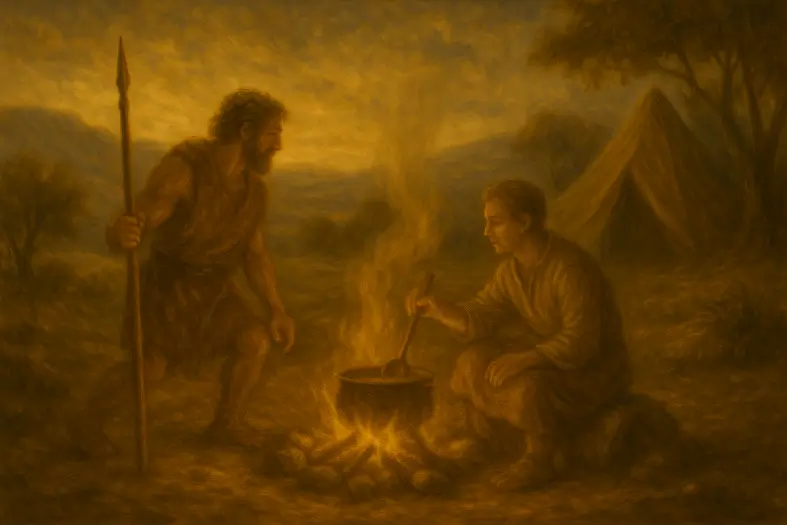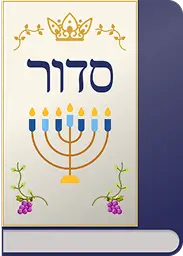
www.Mitzvah-Minute.com
“The Birthright and the Power to Choose”
A Dvar Torah on Parshat Toldot
The scene is so simple it almost feels childish: a hungry brother, a pot of stew, a rushed sale, a forgotten future.
“Sell me today your birthright…
And Esav said: ‘Behold, I am going to die, so what is this birthright to me?’ …
So Esav despised the birthright.” (Bereishit 25:31–34)
But as the classic and modern commentaries show, this isn’t just a bad lunch deal. It’s the moment the Torah defines what covenantal inheritance actually is — and what it means to trade it away.
1. Birthright as Avodah, Not Perk
Rashi is very clear: Yaakov is not hustling for a trophy; he is trying to rescue holy service from unworthy hands.
The lentils, Rashi notes, are a mourner’s food for Avraham’s passing. Yaakov is cooking for a shivah, not running a food truck. He wants the bechorah because the avodah in the Mikdash belongs to the firstborn, and the wicked Esav is unfit to stand there. Esav, by contrast, sees only danger and liability: “Behold, I am going to die” — the service sounds like risk, not privilege. The Torah seals the verdict: “Vayivez Esav et ha-bechorah — Esav despised the birthright.”
In Rashi’s frame, the contrast is sharp:
- Esav – a “hunter with his mouth,” living in the field, quick with religious-sounding questions but driven by appetite and image.
- Yaakov – ish tam yoshev ohalim, whose “mouth is like his heart,” sitting in the tents of Shem and Ever, willing to assume responsibility and risk for avodat Hashem.
The birthright is already moving from status to service.
2. Ramban & Sforno: What You Think is “Nothing” Tells Who You Are
Ramban deepens the psychology. Esav isn’t lacking intelligence. He expects to die young from his dangerous hunting life. If so, the birthright — which only takes effect after Yitzchak’s death — is useless. No wonder he says, “What is this birthright to me?”
But Ramban insists on two crucial points:
- This is not about poverty. Against Ibn Ezra, he argues that Yitzchak was wealthy and honored; the Avot were like kings. Esav is not reacting to a broke father and an empty estate.
- It is about character. Esav’s brutal, impulsive nature cannot value anything beyond the immediate. After eating and drinking, he simply stands up, walks out, and goes back to the field. That’s why the Torah’s final word is contempt: “So Esav despised the birthright.”
Sforno adds a legal and symbolic layer. Esav is so absorbed in his trade that he calls the stew only “that red, red stuff,” reducing nuanced reality to color and craving. Yaakov, by contrast, insists on a proper acquisition — an oath in place of a kinyan, likely with the vessel itself as chalipin. Even after the sale, Esav continues to belittle the birthright. That, says Sforno, proves there was no fraud. Esav meant it.
For both Ramban and Sforno, the “deal” simply exposes who each brother already is:
- One whose world is now cannot carry a covenant built on forever.
- One who is willing to bind himself legally to future service is already acting like a bechor.
3. Rambam, Ralbag, and Abarbanel: Blessing Follows Prepared Character
The philosophical mefarshim push this even further.
For the Rambam, Toldot is a study in how providence tracks intellect and virtue. Esav represents the man ruled by appetite, trading enduring goods for immediate sensation. Yaakov, the tent-dweller, models a life ordered by reason, discipline, and Torah. The bechorah, then, belongs to the person whose mind and character can sustain avodat Hashem. Blessing is not arbitrary magic; it “flows” where there is a vessel ready to receive it.
Ralbag is explicit: a berachah is partly revelation and partly prayer, scaled to the recipient’s readiness — and secondarily to his mazal. Yitzchak's blessings reveal what will naturally and divinely emerge from each son’s formed disposition. Yaakov's integrity and intellectual preparation make the blessing “stick”; Esav’s path leaves him with only conditional, sword-based power: “You will serve your brother — until you break loose.”
Abarbanel ties it all together. The patriarchal blessing is the formal transmission of the covenant, not a sentimental farewell. Yitzchak sincerely thinks Esav might yet mature into that role, so he attempts to draw prophetic clarity down through a moment of joy and filial service — hence the hunted meat. Rivkah, armed with prophecy that “the elder shall serve the younger,” knows that holiness cannot rest on Esav’s unchecked nature. By arranging that Yaakov receive the blessing, she is not stealing; she is aligning human action with divine truth.
When Yitzchak finally trembles and cries, “Gam baruch yihyeh — indeed, he shall be blessed” (27:33), Abarbanel hears awe, not frustration. Yitzchak realizes that his words were guided from Above and have already taken effect. The blessing cannot be revoked because it didn’t originate in him in the first place.
4. Rav Kook, Chassidut, and Rabbi Sacks: The Yaakov–Esav Battle Inside
Chassidic masters and Rav Kook then turn the spotlight inward.
- The Baal Shem Tov and Sfas Emes read “two nations in your womb” as two forces in every soul. Yaakov is the voice of Torah, prayer, and conscience; Esav is raw energy, passion, and drive. The goal is not to destroy Esav but to elevate his strength — to let the “hands of Esav” serve the “voice of Yaakov.”
- Rav Kook sees Yaakov initially “holding the heel” — restraining Esav’s destructiveness — but ultimately growing into Yisrael, who can wear “Esav’s garments” (engage power, politics, art, and culture) while keeping the inner essence holy. The true bechorah, then, is the ability to harness strength for holiness.
- Rabbi Sacks frames Toldot as a meditation on identity and moral choice. Birthright and blessing are not automatic; they must be earned by the one who chooses covenant over comfort. Esav is the man of appetite; Yaakov is the one who can inhabit history with responsibility.
In that light, the story is not only about who gets Eretz Yisrael; it’s about who we let run our inner lives. Every impulsive “I’m starving, just give me the red stuff” moment is a mini-Toldot decision.
5. R’ Avigdor Miller: Seeing Yaakov in a World That Sells Esav
Rav Miller zt”l focuses on perception. If Yitzchak — a giant of holiness — can be deceived by Esav’s appearance, who are we to trust our instincts?
Toldot, he says, teaches us to "see in the darkness". Esav looks impressive: outdoorsman, provider, charismatic. Yaakov looks like a quiet learner. But in Heaven’s accounting, the kol Torah of Yaakov sustains the world, while Esav’s sword is only temporarily tolerated.
The great test of our generation, for Rav Miller, is whether we can re-train our eyes:
- To admire the beit midrash more than the boardroom.
- To feel the “fragrance of Gan Eden” not in luxury but in mitzvah, tefillah, and Torah.
- To recognize that the true bechorah — the power to carry the covenant forward — still rests with the ones sitting in the "tents".
What does this teach us?
The Birthright and the power to choose
It’s not land deeds or ancient titles. It’s the quiet privilege of living as a bearer of Avraham’s covenant:
- Showing up to minyan or a shiur when we’re tired but free.
- Choosing honesty over an easy financial “stew.”
- Protecting Shabbos time, family, and kedushah in a culture that shouts, “Eat now, enjoy now, worry never.”
A small practice for this week:
- When you catch yourself saying, “I need this right now,” pause and ask:
Am I acting from Esav — impulsive, short-sighted — or from Yaakov — thinking about who I’m becoming? - Pick one small area (learning, tzedakah, davening, family time) focus on the task and consciously choose the long-term covenant over the short-term stew (benefit).
Toldot’s message, across Rashi, Ramban, Rambam, Ralbag, Sforno, Abarbanel, Rav Kook, Rabbi Sacks, Chassidut, and Rav Miller, is the same:
Blessing follows the one who is willing to live for something larger than the moment.
May we be zocheh to choose our futures wisely — and to hear, in our own lives, the clear echo of commitment to Torah and avodas Hashem.
📖 Sources
- Full sources available on the Mitzvah Minute Parshas Toldot page.











